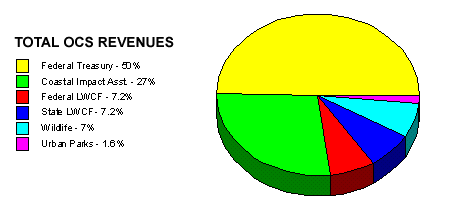





 |
 |
 |
 |
S. 25 - The Conservation and Reinvestment Act of
1999
S. 25 would address conservation and
coastal impact assistance funding needs using Outer Continental
Shelf (OCS) oil and gas leasing revenues. The legislation would: 1)
provide funds to coastal states to offset impacts caused by offshore
drilling, 2) fund the Land and Water Conservation Fund without
further appropriation, and 3) fund state-based wildlife conservation
programs. Key sponsors of the legislation are: Sens. Frank Murkowski
(R-AK), Mary Landrieu (D-LA), John Breaux (D-LA), and Trent Lott
(R-MS).

*The above chart is
based on annual OCS revenue of $4.59 billion projected by the
Minerals Management Service for the year 2000. As the chart
indicates, half of the OCS revenue would go to the Federal Treasury
to meet budget obligations unrelated to conservation.
Wildlife:
7% of OCS revenues ($321 million) to state fish and wildlife
agencies for wildlife conservation, recreation and education
projects. Land & Water Conservation Fund:
16% of OCS revenues ($734 million).
Permanent, automatic appropriation, requires Congressional
approval of federal land acquisitions in excess of $5 million.
Federal-side LWCF - approximately $330 million.
State-side LWCF - approximately $330 million.
Urban Parks and Recreation Recovery Program (UPARR) - $74
million. Coastal Conservation:
27% of OCS revenues ($1.24 billion annually) to 35 coastal
states and territories, including Great Lakes states.
Funds could be used by states and local governments for: air
and water quality; fish and wildlife, wetlands and coastal
restoration; onshore infrastructure and public service needs.
National Wildlife Federation
Concerns:
S. 25 would allow the use of
impact assistance funds to subsidize potentially damaging
infrastructure activities. Any new outer continental shelf
impact assistance program should prioritize funding to projects that
will ameliorate environmental impacts of OCS oil and gas
development. Additionally, no funds should be used for
environmentally destructive projects.
The proposal would
create financial and political incentives for coastal states to
accept inappropriate offshore oil and gas development. State
allocations of revenue are based on a state's proximity to oil and
gas drilling, and the amount of drilling occurring off their shores.
To ensure that this allocation formula does not create incentives
for increased drilling, allocation of funds to coastal states should
not be tied to new leasing, exploration, production, or geographic
proximity to such activities.
The legislation needs to
provide for full funding for both federal and state programs under
the Land and Water Conservation Fund. Although current law
authorizes $900 million annually for LWCF from OCS revenues,
Congress has historically appropriated only about one-third of that
amount. While S. 25 includes automatic appropriation of funds for
the Land and Water Conservation Fund and the Urban Park and
Recreation Recovery Program, it does not fund these programs at
their fully authorized level ($450 million each for state and
federal). In addition, S. 25 includes restrictions on federal land
acquisition that would greatly hinder the ability to acquire new
lands.
The legislation should prioritize use of funds for
nongame wildlife conservation. Nongame wildlife are those
species that are neither hunted or fished, nor threatened or
endangered. Conserving nongame wildlife species before they become
threatened or endangered will allow managers to be more pro-active
in managing our wildlife resources.
S. 25 allocates only
7% of OCS leasing revenues for wildlife conservation. Nongame
wildlife conservation has been seriously underfunded for decades.
Many states rely on revenue sources such as tax check-offs or
conservation license plate revenues that are unable to match the
growing need. A substantial infusion of funds is critical to address
the conservation needs of wildlife species. | |
